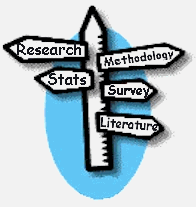
Research Methodology
Preparing and writing the literature review
|
|
Research Methodology Preparing and writing the literature review |
One of the most important early steps in a research project is the conducting of the literature review. This is also one of the most humbling experiences you're likely to have. Why? Because you're likely to find out that just about any worthwhile idea you will have has been thought of before, at least to some degree. Every time I teach a research methods course, I have at least one student come to me complaining that they couldn't find anything in the literature that was related to their topic. And virtually every time they have said that, I was able to show them that was only true because they only looked for articles that were exactly the same as their research topic. A literature review is designed to identify related research, to set the current research project within a conceptual and theoretical context. When looked at that way, there is almost no topic that is so new or unique that we can't locate relevant and informative related research.
Some tips about conducting the literature review. First, concentrate your efforts on the scientific literature. Try to determine what the most credible research journals are in your topical area and start with those. Put the greatest emphasis on research journals that use a blind review system. In a blind review, authors submit potential articles to a journal editor who solicits several reviewers who agree to give a critical review of the paper. The paper is sent to these reviewers with no identification of the author so that there will be no personal bias (either for or against the author). Based on the reviewers' recommendations, the editor can accept the article, reject it, or recommend that the author revise and resubmit it. Articles in journals with blind review processes can be expected to have a fairly high level of credibility. Second, do the review early in the research process. You are likely to learn a lot in the literature review that will help you in making the tradeoffs you'll need to face. After all, previous researchers also had to face tradeoff decisions.
What should you look for in the literature review? First, you might be able to find a study that is quite similar to the one you are thinking of doing. Since all credible research studies have to review the literature themselves, you can check their literature review to get a quick-start on your own. Second, prior research will help assure that you include all of the major relevant constructs in your study. You may find that other similar studies routinely look at an outcome that you might not have included. If you did your study without that construct, it would not be judged credible if it ignored a major construct. Third, the literature review will help you to find and select appropriate measurement instruments. You will readily see what measurement instruments researchers use themselves in contexts similar to yours. Finally, the literature review will help you to anticipate common problems in your research context. You can use the prior experiences of other to avoid common traps and pitfalls.
Trochim, M.K. 2001. Research Methods Knowledge Base. Cornell University Website. http://trochim.human.cornell.edu/kb/probform.htm